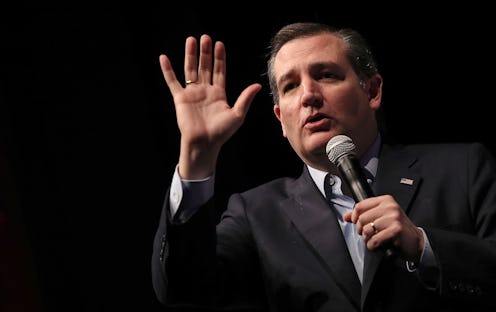News
Ted Cruz Didn't Go Home Quite Empty Handed
We’ve survived the latest wave of primaries. Five states cast their votes on Tuesday, and perhaps unsurprisingly, Donald Trump swept all of them. This is, of course, bad news for Ted Cruz, whose number one goal at this point is to win as many delegates as possible in hopes of denying Trump the nomination. So, how many delegates did Ted Cruz win on Tuesday?
When all the dust was settled, Cruz ended the night having won a total of — drumroll, please — three delegates. Yup, just three. Cruz managed to pick up three from Rhode Island, but otherwise, he came up completely empty-handed. Amazingly, Cruz even did worse than John Kasich, who managed to pick up five delegates from Rhode Island. Trump, meanwhile, won at least 105 delegates on Tuesday, so yeah, he had a pretty great night.
The biggest question in the Republican race right now is whether Cruz (and to a much lesser extent, Kasich) will win enough delegates to deprive Trump of a majority. If they succeed in keeping the Donald under 1,237 delegates, it will force a contested convention in July, and Trump almost certainly won’t become the nominee if there’s a contested convention.
Unfortunately, it’s still a bit too soon to say whether the #StopTrump folks will succeed in their goal. The only really big state to vote on Tuesday was Pennsylvania, but thanks to the state’s unusual method of delegate allocation, the outcome of its primary doesn’t actually matter very much. The other states to vote on Tuesday simply weren’t worth enough delegates to tip the scales one way or another, although they did certainly make Trump's path to the nomination a bit wider.
But we probably won’t know whether Trump has a majority until after June 7, when California casts the last votes of the primary. And even that might not settle it: If Trump falls, say, 100 delegates short of a majority in the primaries, he could potentially make up that difference by winning over individual delegates between the California primary and the national convention. The possibility of such a “shadow primary” is part of why Trump hired Paul Manafort, a Republican hatchetman skilled in the dark arts of delegate gathering, to help him clinch the nomination.
The next state to vote is Indiana, and there’s no doubt that its primary results will be scrutinized endlessly by the national press. But in all likelihood, we won’t know the identity of the Republican nominee until the convention, after all of the delegates have cast their votes.
*54 of Pennsylvania's 71 delegates are unbound, which means they are unaffected by the state's primary vote. We won't know which candidate they support until they cast their votes at the national convention.
